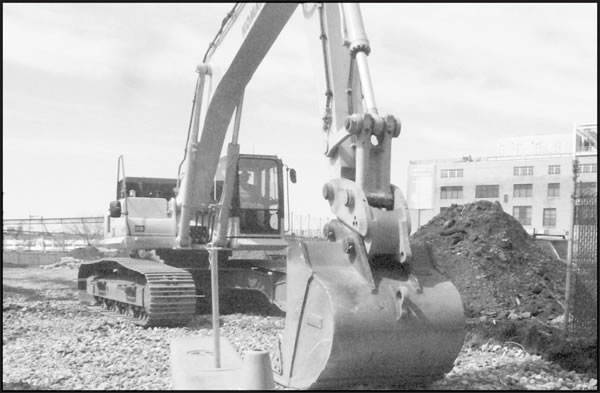By Albert Amateau
Hudson Sqaure and Tribeca opponents of the Department of Sanitation garage proposed for the UPS property on Spring St. lost a key battle last week when an Appellate Division panel unanimously affirmed a lower court dismissal of their lawsuit to block the project.
The five-judge panel said on Thurs., April 14, that the city took the requisite hard look at the proposed 120-foot-tall garage to serve three Sanitation districts. The project also includes a salt shed to be built on Sanitation Department property on the south side of Spring St. adjacent to the Holland Tunnel ventilation tower.
The appellate panel also said the opponents had no standing to seek to overturn a 2005 court-approved agreement that the city would remove Sanitation equipment from Gansevoort Peninsula by 2013 to allow the peninsula to become part of the Hudson River Park. The Spring St. project will eventually accommodate a portion of the Sanitation equipment from the 8-acre peninsula on the Hudson River between Gansevoort and Little W. 12th Sts.
The appellate panel also held that the opponents had exceeded a four-month, statute-of-limitations period for filing the lawsuit challenging the Gansevoort Peninsula agreement.
Michael Kramer, a consultant to the St. John’s Center — a large, multi-block building on the project site’s northern border and one of the opponents who sued to block the garage — called the ruling disappointing. The plaintiffs have not yet decided whether to take their case to the Court of Appeals in Albany, the state’s highest court, Kramer said. Because the appellate decision was unanimous, the plaintiffs need permission to appeal further from both the Appellate Division and the Court of Appeals.
The city was gratified by last week’s decision, saying that the garage-and-salt-shed project was an important part of the citywide Solid Waste Management Plan.
“The court correctly found that the city fully complied with all applicable environmental review procedures and land-use statutes and requirements in the selection of this site,” said Elizabeth I. Freedman, senior counsel of the Appeals Division of the city Law Department, who conducted the case for the city.
Preliminary preparation work has started on the nearly 2-acre site between Washington and West Sts from Spring to Charlton Sts.
However, one court issue remains: an 11-foot-1-inch overgrown strip of land on the border between the St. John’s building and the Sanitation garage site is in dispute and an April 26 hearing is scheduled. The strip is part of the UPS property but has been maintained since 1976 by St. John’s, which claims ownership under the legal doctrine of adverse possession.
Kramer said the three-district garage, which is to accommodate garbage trucks for Sanitation District 5, covering central Midtown, as well as Districts 1 and 2, covering Lower Manhattan and Greenwich Village, the West Village and Soho, respectively, is oversized and would have a major negative impact on increasingly residential Hudson Square.
“There was no discussion about the high cost of this project and the overpayment to UPS for the right to build on the site,” said Kramer. The city has agreed to pay UPS $116 million for the development rights, and the entire project is estimated to cost about $500 million. Kramer also said that local elected officials who voted to approve the project favored other neighborhoods and had used the process to promote Hudson River Park with Department of Sanitation dollars.
“The influx of trucks will further choke traffic on Washington and West Sts. and negatively affect the quality of life for the residents, business and property owners, who were never given a meaningful role in the decision-making process,” Kramer said.




































